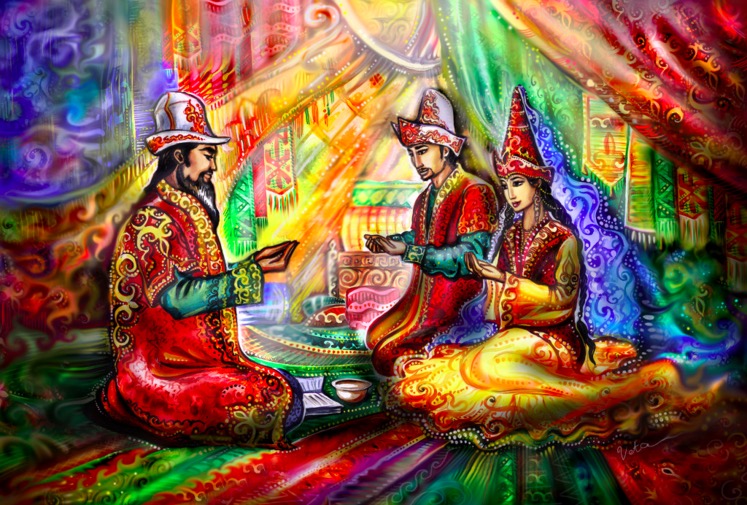Wedding traditions and customs of the Kazakh people

Wedding traditions and customs of the Kazakh people Kazakh customs related to marriage are diverse. In the old days, Kazakhs usually got married by prior arrangement. Moreover, the fathers never asked the children. This is not surprising, since the agreement was made when they were young or not yet born.
If there was no agreement, then the young people were brought together during the "Kyz Koru" ceremony. In fact, we are talking about "bride show".
The girl's family could not refuse to hold it. During the ceremony, the girlfriends who made up the retinue of the potential bride criticized the suitor out loud. Those who accompanied the guy did not remain in debt.
If the young people liked each other, they immediately agreed on a wedding. It was preceded by a number of ceremonies.
Matchmaking was performed by the main representatives of the bride and groom — "bas kuda". Usually these were the heads of the clans. Fathers of the young received the honorary title of "bauyzdau kuda", after which they became close relatives.
The bride's father and herself were presented with valuable gifts. In response, the groom's representatives were presented with "kuiryk bauyr" — a dish of liver and bacon. After that, the marriage contract was considered concluded. The bride's relatives gave gifts to the departing matchmakers.
As a rule, the payment was received in kind: they took cattle, furs, gold and silver jewelry, etc. The bride brought a dowry — "kyz zhasauy". They were mostly household items, clothing, and sometimes cattle.
Custom has ordered all the bride's relatives and matchmakers to gather at a bountiful table. The feast was accompanied by music, dancing and songs. It lasted all night, and in the morning the girl left for the groom.
This ceremony was held the day after the wedding feast. The bride and groom dressed in festive clothes and, accompanied by a couple of witnesses, went to the mosque. A prayer was read here, after which the young were given a bowl with water and silver. They drank from the cup, and the ceremony was completed.
Post-wedding and other traditions of the Kazakh people
When the celebrations dedicated to the wedding were over, it was the turn of other rites:
Kyz koru
If there was no agreement, then the young people were brought together during the "Kyz Koru" ceremony. In fact, we are talking about "bride show".
The girl's family could not refuse to hold it. During the ceremony, the girlfriends who made up the retinue of the potential bride criticized the suitor out loud. Those who accompanied the guy did not remain in debt.
If the young people liked each other, they immediately agreed on a wedding. It was preceded by a number of ceremonies.
Kuda tusu
azakh traditions and customs required formalization of relations with new relatives. Therefore, the "Kuda tusu" rite was held, that is, matchmaking. The groom's family notified the bride's father in advance about its holding. He organized a feast and called his family members.Matchmaking was performed by the main representatives of the bride and groom — "bas kuda". Usually these were the heads of the clans. Fathers of the young received the honorary title of "bauyzdau kuda", after which they became close relatives.
The bride's father and herself were presented with valuable gifts. In response, the groom's representatives were presented with "kuiryk bauyr" — a dish of liver and bacon. After that, the marriage contract was considered concluded. The bride's relatives gave gifts to the departing matchmakers.
Kalyn mal
When mutual consent to the marriage was reached, the rituals of the Kazakh people demanded to pay a ransom for the girl being taken away from home. The price of the bride was determined by agreement, and bidding was not only allowed, but also welcomed.As a rule, the payment was received in kind: they took cattle, furs, gold and silver jewelry, etc. The bride brought a dowry — "kyz zhasauy". They were mostly household items, clothing, and sometimes cattle.
Kyz uzatu
This holiday was arranged in the girl's house. It was her sending-off event.Custom has ordered all the bride's relatives and matchmakers to gather at a bountiful table. The feast was accompanied by music, dancing and songs. It lasted all night, and in the morning the girl left for the groom.
Kelin tusiru
Traditions of Kazakhstan regulated the arrival of the bride to her future husband. The girl:
• was driven to the outskirts of the village. Her face was covered and she stayed there;
• than a group of women, relatives of the young man, came out to her and took her to his house.
Already in place they were waiting for the arrival of the invitees. A wedding feast was prepared for them, at the beginning of which another ceremony was held — "betashar". The bride was first put behind a curtain, and then taken out to the guests, holding her by the arms. They opened her face, leaving her hair hidden. The bride greeted all the guests, after which the wedding continued.
Neke kiyu
The main Kazakh wedding ceremonies were completed after the wedding, which was carried out according to the norms of Muslim law.This ceremony was held the day after the wedding feast. The bride and groom dressed in festive clothes and, accompanied by a couple of witnesses, went to the mosque. A prayer was read here, after which the young were given a bowl with water and silver. They drank from the cup, and the ceremony was completed.
Post-wedding and other traditions of the Kazakh people
When the celebrations dedicated to the wedding were over, it was the turn of other rites:
Zholdyk
This ceremony was performed by the spouse of the groom's older brother on the wedding night. She made the bed for the young and explained to them in an ironic way how to behave at night. Her work in the morning was rewarded with a gift.Kudalyk
The arrival of a young relative in her husband's house. Those who arrived brought gifts and received gifts from the hosts. The gifts were presented to the new wife. It was called "onir salu".Yessik ashar
This is the name of the newlywed's visit to the father-in-law's house. He went there alone, since his wife was forbidden to see her parents for a year. The woman had to visit all her husband's relatives.Contacts
General questions
Expedition, events
Interaction with Media
Legal information
ACCESSION QUESTIONARY
Individual
Status (on the procedure of accession to members and membership in the RPA in PDF format)
Legal entity
Status (on the procedure of accession to members and membership in the RPA in PDF format)

Спасибо!
Ваша заявка успешно отправлена
Мы свяжемся с вами в ближайшее время
Submit a work to the “My Kazakhstan” contest

Спасибо!
Ваше фото успешно отправлено
Ожидайте выбора победителей!

Спасибо!
Ваш заказ успешно отправлен
Мы свяжемся с вами в ближайшее время
